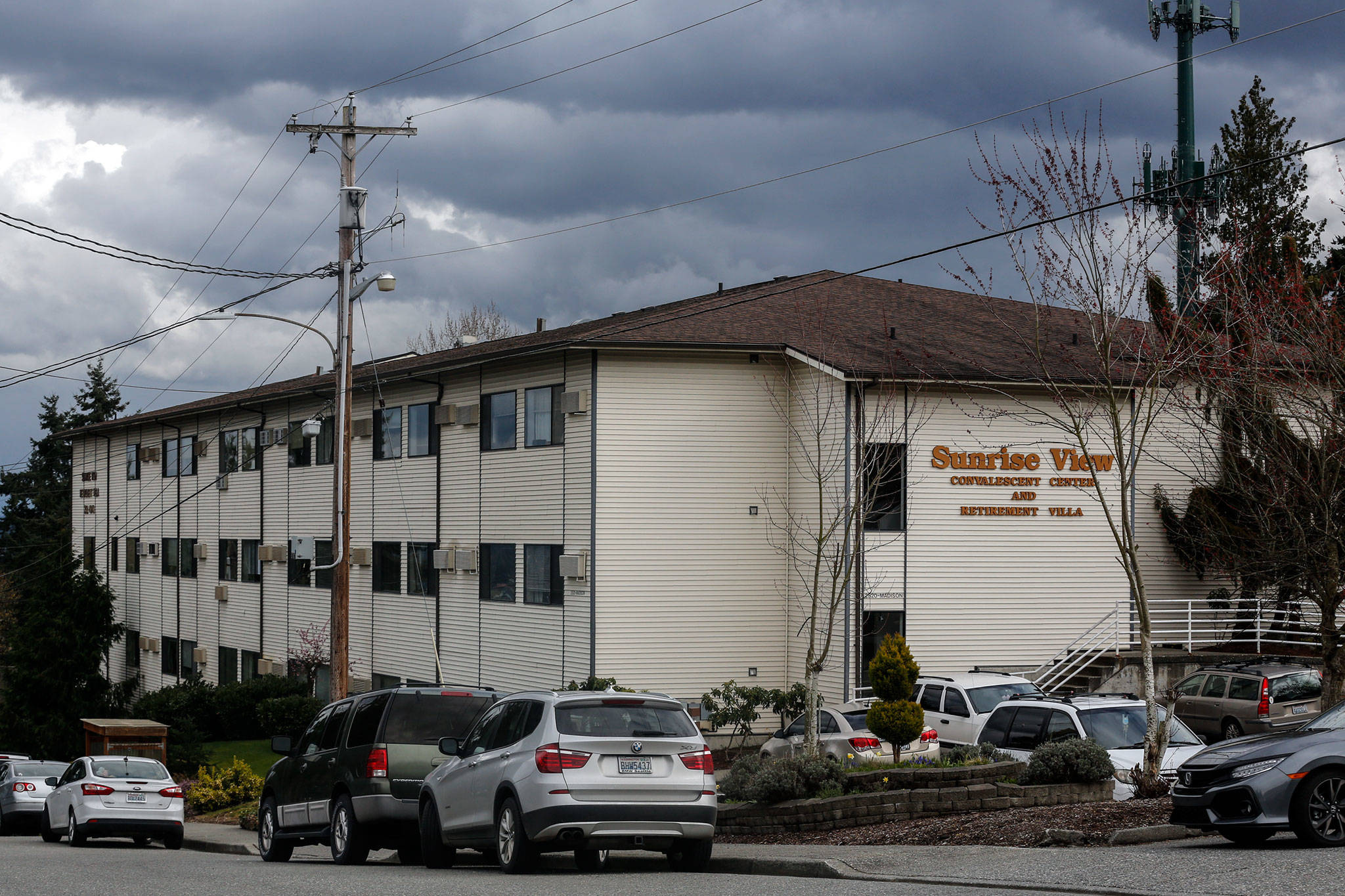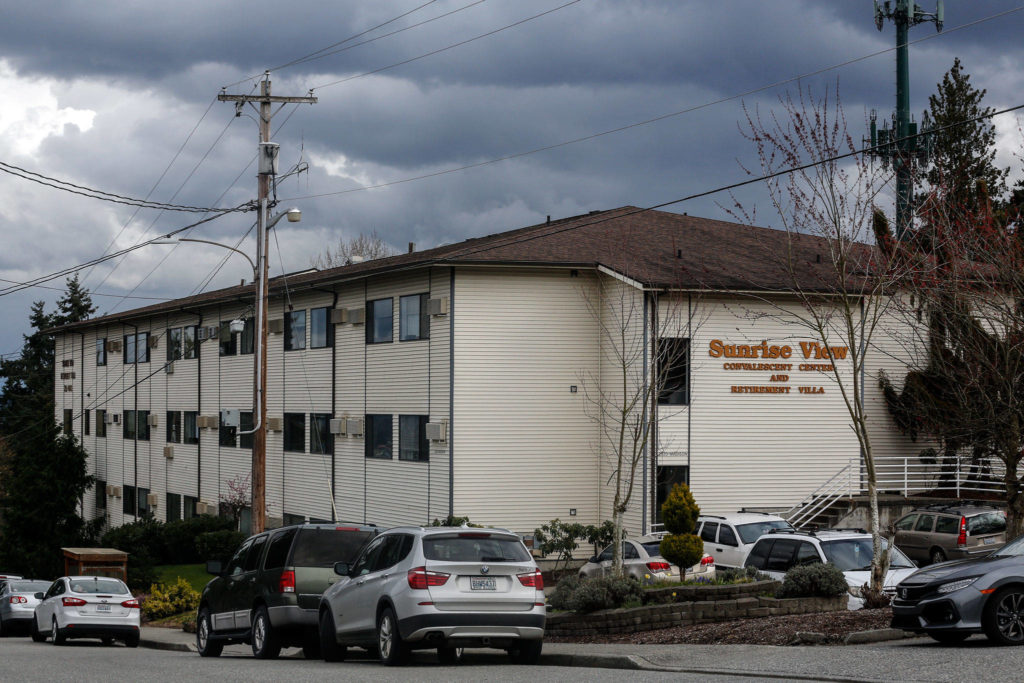EVERETT — Homemade masks and men’s long-sleeve dress shirts, each laundered several times a day, have replaced standard personal protective equipment at Sunrise View Convalescent Center and Retirement Villa.
Staff here are wrestling with a shortage of proper masks and gowns amid an outbreak of COVID-19 that has left 10 of its residents dead — and there’s no end in sight.
“We’re in for the long haul,” Sunrise administrator Diane Lopes said. “It has to be all about reusable.”
In recent days, COVID-19 cases in Snohomish County nursing homes spiked. Twenty facilities reported a staff member or resident had tested positive for the virus as of Friday, compared to the seven reported a week earlier. Tests were still pending in connection with five more care homes.
Statewide, at least 62 long-term care facilities had confirmed cases, while 108 more had suspected or unconfirmed cases as of March 27, said Chris Wright, a spokesman for the Washington Department of Social and Health Services.
Long-term care facilities have proven more vulnerable to the virus due to the advanced age of most residents, visitation practices, limited staffing and the tendency of long-term care providers to work at multiple locations, according to health officials and industry advocates.
“It appears that this virus almost targets individuals who are in nursing homes, ” said Robin Dale, president and CEO of the Washington Health Care Association, a nonprofit that represents hundreds of nursing homes and assisted living facilities across the state. “And the virus just seems to be merciless on this population.”
Adding to the plight of long-term care facilities is a dearth of personal protective equipment — gloves, masks and gowns — that has left nursing home workers and the residents they serve at risk.
Under guidelines published by the Washington State Department of Health last month, long-term care facilities with confirmed COVID-19 cases are being prioritized for personal protective equipment, alongside nurses, doctors and first-responders. But global demand has exceeded supply.
“Unfortunately, we’re not able to fill even all the needs in that Tier 1 category,” said Jerrod Davis, assistant secretary of the state health department’s Disease Control and Health Statistics Division, during a recent media conference.
Altogether, the host of difficulties faced by nursing homes and assisted living facilities paint a picture of an industry doomed to be hard-hit by the crisis, even as visitors are barred and other steps are taken to prevent the spread of infection.
“Is the average nursing home ready? Let me put it this way: My sense is the prevailing wisdom is, ‘It’s going to happen,’” said Steven Felton, director of the Seattle-based Felton Health Care Specialists, a contractor that works with some adult group homes in Snohomish County. “I think everybody expects that they’re going to have COVID in their building eventually, no matter how careful they are.”
‘The right thing’
The sharp increase in cases at local nursing homes comes as the state tries to transfer COVID-19 hospital patients into long-term care facilities to free up bed space. Extra hospital capacity could become essential as intensive care beds fill up.
Lopes worries about the impact the influx of patients will have on her already-strained facility.
Of the more than 100 confirmed cases in the county connected to long-term care facilities as of Friday afternoon, 39 are at Sunrise. Since March 28, the new coronavirus has been a factor in the death of seven Sunrise patients.
In a phone call with other long-term care facilities and Providence Regional Medical Center Everett earlier this week, Lopes said the idea of designating facilities to handle only COVID-19 positive cases was discussed — a role she said she’d be willing to take on.
“I realize, unfortunately, that Sunrise View, in this whole community pandemic is to be a place where COVID-19 positive people go,” Lopes said. “That appears to be kind of reality.”
But before that happens, Lopes said all of her residents need to be tested so that they can make an informed decision about whether to stay or move to another facility. She said she’d most likely advise those who test negative to move.
“Do I want to open the doors now when I have COVID-negative people? I don’t think that’s fair,” Lopes said. “I just want to do the right thing.”
The problem, she said, is a shortage of needed tests.
“Everybody thinks we have tests and we’re withholding them,” Lopes said. “We don’t. We have asked the health department, and we can’t get tests.”
The Snohomish Health District “is not taking an active role in determining who does and doesn’t get tested,” Dr. Chris Spitters, health officer for the district, said during a Friday media briefing.
“Certainly if we see or hear about someone who ought to be tested, we’ll make that recommendation. But the trigger and execution of that is through the health care providers within the facility,” Spitters said. “We want to continue to emphasize that long-term care facilities need to be proactive and transparent, and they should not wait for multiple people to become symptomatic.”
The state health department has directed health care providers to focus only on testing people who are symptomatic.
“In a perfect world we would test everyone, but we are not in a perfect world.” said Terry Robertson, CEO of Josephine Caring Community, a Stanwood nursing home and assisted living facility that’s been linked to more than 20 cases. “Feels lately like another universe.”
‘An afterthought’
From the start, the outbreak has laid bare shortcomings of a public health system that has failed to fulfill long-term care facilities’ personal protective equipment and testing needs, said Deb Murphy, president and CEO of LeadingAge Washington, which represents nonprofit long-term care facilities throughout Washington.
Those shortfalls continue to plague the system today, as nursing homes grapple with the question of which cases to confirm, given the limited supply of tests.
“Nobody knows how to get these tests,” said Laura Hofmann, LeadingAge’s director of clinical & nursing facility regulatory services.
Finding personal protective equipment, too, remains a hurdle — in part because the long-term care industry was left out of an inventory supply survey conducted by state officials and a nonprofit early on, Hofmann said.
“I don’t even know if we were an afterthought,” Murphy said, adding that long-term care industries have had to “fight tooth-and-nail” to be recognized as health care providers as the crisis has unfolded.
Meanwhile, surveyors from federal government agencies charged with nursing home oversight have continued to come into buildings without personal protective equipment, exposing staff and residents to unnecessary risks, Murphy said. Those same agencies have lagged in providing guidance to nursing homes and assisted living facilities navigating the crisis.
Amid the pandemic, a common theme has emerged, she said: a lack of connection and coordination at the national level among those tasked with ensuring the welfare of long-term care facilities and their residents.
“This really is a national federal failure,” Murphy said. “There has been a complete failure to timely and appropriately respond to the coronavirus in every way.”
The state’s nursing homes were “on their knees” before the virus hit, Robertson said. The facilities face strict rules, and violations carry hefty fines. Adding to that financial burden is inadequate funding for Medicaid, a state and federal program that provides medical cost assistance for some low-income people.
“We have about 1,200 less beds today than we did just 2 years ago,” Robertson said in an email.
Caring for COVID-19 patients creates “a huge drain on tangible and human resources,” inviting regulatory scrutiny that nearly guarantees “harsh citations with fines” and confronting nursing homes with “the very real threat of closure,” he said.
The crisis has underscored other challenges, too, that aren’t new to long-term care facilities.
A direct care staffing shortage has for years been an issue, with the demand for nurses and other practitioners simply outweighing the supply, said Dale, of the Washington Health Care Association.
“Now with caregivers getting sick, it’s even making things harder,” Dale said. “Everything is just kind of compounding.”
‘Bless them’
The Snohomish Health District is providing long-term care facilities with guidance and on-site assistance to identify and control COVID- 19, Spitters said on Friday. The district will soon hire more people for technical and clinical positions that will help with those efforts, he said.
“The growing number of facilities with cases remains one of the health district’s top priorities in terms of control and prevention of transmission,” he said.
Nine pallets of protective gear from a federal stockpile were delivered to the county on March 27, and the equipment has been distributed by the local emergency coordination center. Some of the gear went to long-term care facilities with COVID-19 patients, Spitters said.
Sunrise received its first delivery from the county on Wednesday — several dozen masks, hand gel, face shields and 100 disposable gowns, Lopes said.
Almost all 80 employees are showing symptoms, including feeling achy and weak and lacking a sense of taste and smell, she said. About half have been tested and about 15 were found positive for the virus. Those employees self-quarantined before returning to work.
“The staff has calmed down,” she said. “Bless them for coming to work. Really nobody wants to be exposed, and here you are working day in and day out.”
While care homes wrestle with big-picture challenges exacerbated by the pandemic, long-term care residents and their family members are bearing the brunt of the human cost.
The health district has not identified long-term care facilities with fewer than five cases, citing patient privacy rules — a move that has left some families with relatives in nursing homes and assisted living facilities in the dark, as the case count rises.
Some rest assured that their family members are well taken care of, even if they’re unable to visit.
Others worry.
A woman whose mother lives at Sunrise said she has struggled to get answers after she heard from staff that her mother’s roommate had tested positive for COVID-19.
“I get the fact that they’re really stressed out and strapped there,” said the daughter, who wished to remain anonymous. “I just want some answers and some reassurance through this.”
Her mother is not exhibiting symptoms of COVID-19, she said. She hasn’t been told whether her mother has been tested for the coronavirus, or whether she’s being presumed positive. She did, however, receive a general update this week that was emailed to family members of all residents, explaining that Sunrise doesn’t have control over when people will be tested.
The daughter feels somewhat helpless — left to watch as the virus takes the lives of her mother’s friends.
“It just really stops my heart,” she said. “She’s losing people in there she considers family.”
Rachel Riley: 425-339-3465; rriley@heraldnet.com. Twitter: @rachel_m_riley.
Talk to us
> Give us your news tips.
> Send us a letter to the editor.
> More Herald contact information.


























